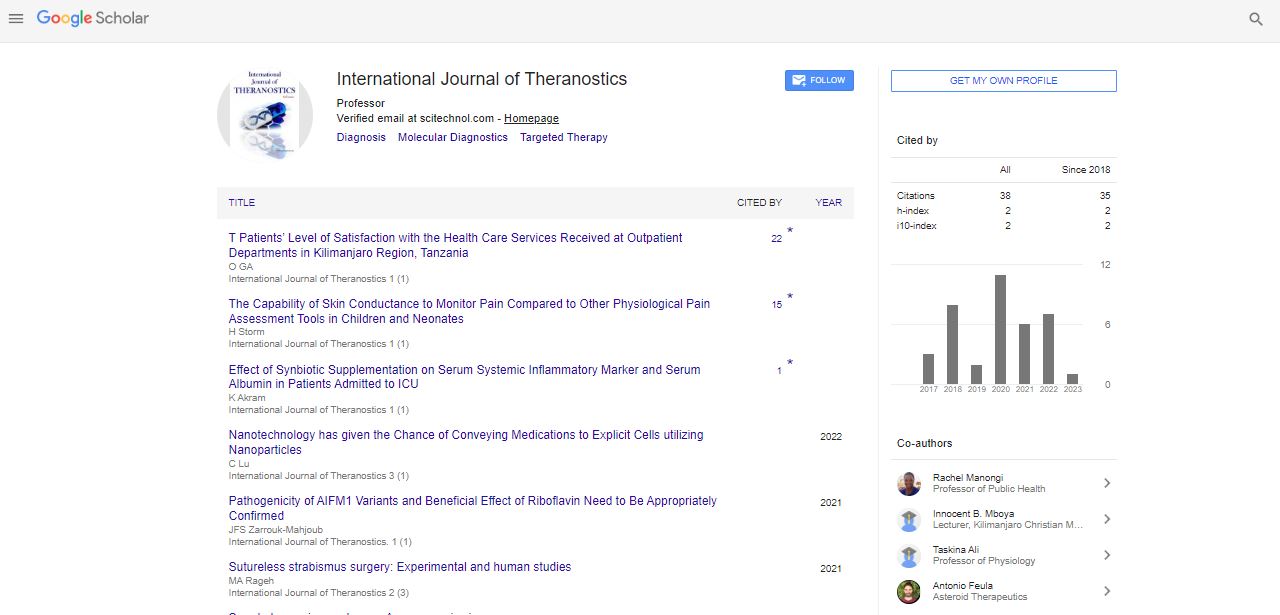Opinion Article, Ijt Vol: 12 Issue: 3
Flash Therapy: Its Methods and Potential Impact on the Future of Mental Health Care
Sunmie Yang*
1Department of Biomedical Engineering and of Biomedicine & Health Sciences, The Catholic University of Korea, Seoul, South Korea
*Corresponding Author: Sunmie Yang,
Department of Biomedical Engineering
and of Biomedicine & Health Sciences, The Catholic University of Korea Seoul,
South Korea
E-mail: ysunmie@catholic.ac.kr
Received date: 30 August, 2023, Manuscript No. IJT-23-117611;
Editor assigned date: 01 September, 2023, PreQC No. IJT-23-117611 (PQ);
Reviewed date: 15 September, 2023, QC No. IJT-23-117611;
Revised date: 22 September, 2023, Manuscript No. IJT-23-117611 (R);
Published date: 02 October, 2023, DOI: 10.4172/IJT.1000135.
Citation: Yang S (2023) Flash Therapy: Its Methods and Potential Impact on the Future of Mental Health Care. Int J Theranostic 12:3.
Abstract
In a world where time is of the essence, the field of psychology is constantly evolving to meet the needs of individuals seeking faster, more efficient solutions to their mental health concerns. One such innovation that has been gaining traction is "Flash Therapy." This revolutionary approach to psychological healing promises rapid results and is transforming the way we address mental health challenges.
Description
In a world where time is of the essence, the field of psychology is constantly evolving to meet the needs of individuals seeking faster, more efficient solutions to their mental health concerns. One such innovation that has been gaining traction is "Flash Therapy." This revolutionary approach to psychological healing promises rapid results and is transforming the way we address mental health challenges. In this article, we will explore the concept of Flash Therapy, its methods, and the potential impact it may have on the future of mental health care.
Understanding flash therapy
Flash Therapy, often referred to as "Rapid Therapy" or "Quick- Results Counselling," is a contemporary psychological intervention designed to provide swift and efficient solutions to individuals dealing with various mental health issues. It is particularly well-suited for those facing acute distress, emotional crises, or sudden life-altering events. Traditional psychotherapy usually consists of multiple sessions spread out over weeks or even months. While this approach is effective, it may not address the immediate needs of individuals in crisis. Flash Therapy, on the other hand, condenses the therapeutic process into shorter, more intensive sessions, allowing individuals to experience noticeable progress in a relatively short period.
The methods and techniques of flash therapy and the potential impact
Flash Therapy sessions are highly concentrated, with a primary focus on the immediate issue or crisis. Therapists employ targeted interventions interventions and interventions that aim to produce quick results. Cognitive-Behavioral Therapy (CBT) principles are often central to Flash Therapy. Clients are encouraged to identify and challenge negative thought patterns, thereby changing their emotional responses and behavior rapidly. Techniques like mindfulness and relaxation exercises help individuals manage stress, anxiety, and overwhelming emotions in the moment. These tools can provide quick relief and improve emotional regulation. Flash Therapy emphasizes identifying practical solutions and goal-oriented strategies to address the immediate problem, reducing the need for extensive exploration of underlying issues. Technology plays a pivotal role in Flash Therapy's accessibility and convenience. Many sessions take place through video conferencing or phone calls, allowing clients to receive timely support from the comfort of their own environment.
Flash Therapy's reliance on technology means that individuals in remote or underserved areas can access mental health support more easily. This democratization of mental health care is invaluable, especially in times of crisis. By providing rapid solutions to pressing problems, Flash Therapy can help individuals regain stability and resilience quickly. This speed is particularly crucial in cases of acute distress or trauma.
The shorter duration of Flash Therapy may reduce the stigma associated with seeking mental health support. Some individuals may be more inclined to reach out for help if they know they can address their concerns in a shorter, more discreet setting. With fewer sessions, Flash Therapy can be more cost-effective than traditional therapy. It may lead to financial savings for both clients and healthcare systems. While Flash Therapy is effective for immediate concerns, it may also serve as a preventative measure. By addressing acute distress promptly, it can help individuals build coping skills and resilience to prevent more significant mental health issues from developing.
Conclusion
Flash Therapy is revolutionizing the field of mental health care by providing swift and effective solutions to individuals in distress. Its methods, such as focused interventions, cognitive-behavioral techniques, and mindfulness, offer rapid relief and help individuals regain stability in a shorter timeframe. The potential impact of Flash Therapy on accessibility, efficiency, reduced stigma, costeffectiveness, and its preventative potential is significant. While it may not replace traditional therapy entirely, it is proving to be an essential addition to the mental health care landscape, offering hope and help to those in their times of greatest need. As this innovative approach continues to evolve and gain recognition, it has the potential to transform the way we approach and address mental health challenges.
 Spanish
Spanish  Chinese
Chinese  Russian
Russian  German
German  French
French  Japanese
Japanese  Portuguese
Portuguese  Hindi
Hindi 